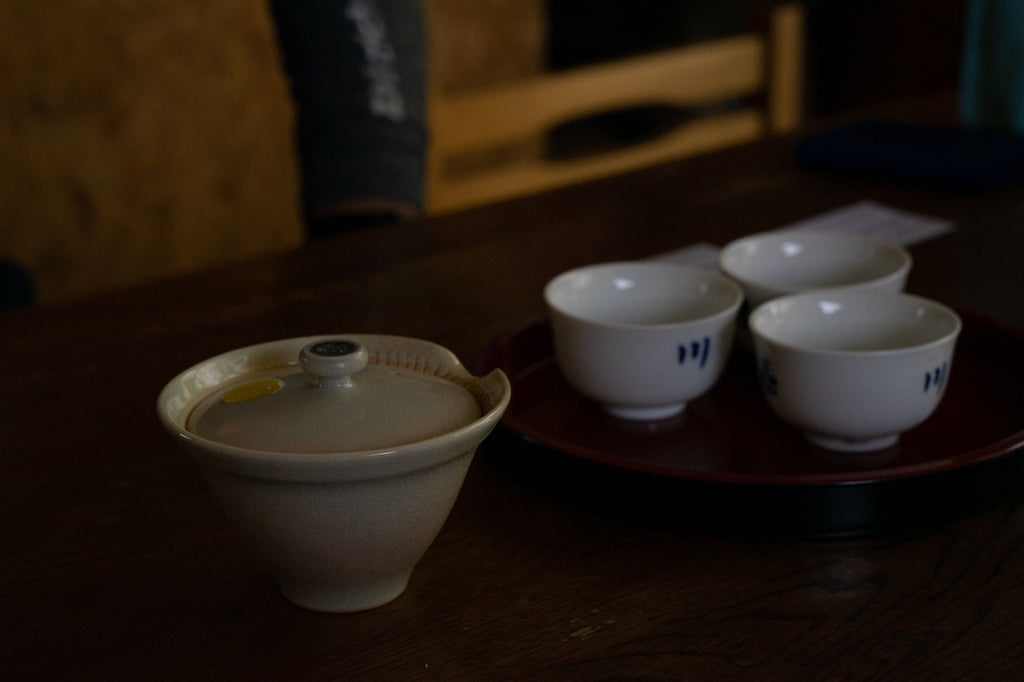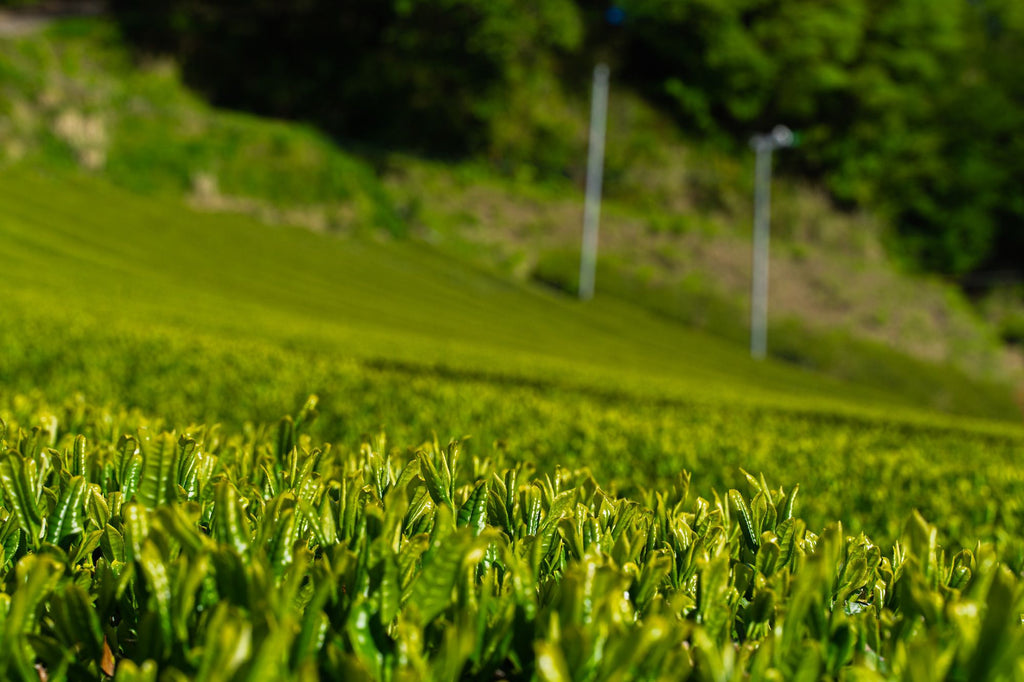Kawane Honcho, Shizuoka Prefecture, is located upstream of the Oi River, with tea fields spreading here and there in the mountains along the riverbank.
This area has long been known as a production center for fine tea.
Surrounded by the steep mountains of the Southern Alps, the area has a significant temperature difference. In the mornings and evenings, the river mist creates a natural curtain. The slow-growing shoots are soft and moist and have a fragrant aroma unique to the mountainous area.
This time, we visited Taruwaki Tea Farm, a history of over 200 years in Kawane Honcho, one of Japan's most delicate tea production areas.
Kawane Honcho, a famous tea production area since ancient times

After getting off at the Shimada-Kanaya Interchange on the Tomei Expressway, it takes less than an hour by car. As you drive up the winding mountain road along the Oi River, you will gradually start to see tea fields.
This is Kawane Honcho. In this remote mountainous area, the highest quality tea has been produced since ancient times.
The slopes of the tea fields are so steep that there are many places where it is not possible to use a riding plucking machine. As the tea industry continues to modernize and become more efficient, it is difficult to take advantage of the slopes.
On the other hand, the moderate sunlight, significant temperature differences, and river mist that appears in the morning and evening, all of which are blocked by the mountains, are necessary elements for producing fragrant tea.
It is a region that has both strengths as a tea-growing area that produces delicious tea and difficulties in farming due to its rugged location.
Yasuaki Taruwaki, the eighth generation of the Taruwaki family.

These fields of Taruwaki Tea Farm are located at an altitude of 630 meters. The fields are spread out in an area that is just as high as the Sky Tree.
The fields they manage are about 22,000 square meters. It is not a large scale on the national scale. Still, Taruwaki Tea Farm has been growing tea organically for more than 30 years. Considering the time and effort that goes into it and the difficulty of farming in the mountains, it is still more than enough.

Yasuaki Taruwaki, the eighth generation of the Taruwaki family who used to run a forestry business, has been growing tea for 20 years. It is impressive that he manages this large organic field by himself.
"This land itself is about 200 years old. The land itself is about 200 years old; I think it dates back to the Edo period. Since my father's generation, the forestry business was ruined, so we reclaimed the cedar forest and expanded the tea plantation. There were no other tea fields, so we cultivated without pesticides and organically. It's a good example of recycling-oriented agriculture."
There are several requirements for pesticide-free tea production. One of them is to be located away from the surrounding fields. The pesticides used in the surrounding fields will be carried by the wind, and insects and animals will gather in the pesticide-free fields. They have a lot of concerns, such as being disliked by the surrounding farmers.
The fact that this land is in the middle of a steep mountain and there are no other fields around makes it possible to grow without pesticides.
Why make tea organically?

"I don't want to make tea like dashi, so I don't need excessive fertilizer."
A dashi-like tea is a tea with a thick and rich flavor.
Basically, organically grown tea has less flavor than conventionally grown tea. Since the taste of tea is produced from fertilizer, fertilizer is essential to make a rich, flavorful, soup stock-like tea.
On the flip side, organic tea, which is grown in an environment close to nature with no significant human intervention, shows the characteristics of the cultivar and the region straight away.
Yasuaki's goal is to produce mountain-grown-teas that shine with the individuality of the tea.
The aroma created by the mountains. Open-field and asashimushi mountain-grown-teas.

It has long been said that tea from the mountains is more fragrant.
The surrounding mountains moderately block the sunlight. The morning fog generated from the water evaporated from the river gives moisture to the tea leaves, slowly growing tender shoots.
The soft buds are easy to process, and even if the steaming time is not long, the tea can be rolling sufficiently. In fukamushicha(deep-steamed tea), where the steaming time is extended, a lot of heat is applied. The aroma of the tea is lost to a small extent. If you want to get the most out of the cultivar's unique scent, it naturally has to be "shallowly steamed."
In addition, Taruwakien grows tea in the open filed without the covering process. The covering process prevents theanine (a flavor component) from changing to catechin (astringent ingredient), which increases the flavor and darkens the color of the tea. Nevertheless, the "covering aroma" imparted by the covering process can mask the unique flavor of the cultivar.
The astringency of the tea leaves is increased in open field cultivation. However, you can taste more of the aroma of the tea from that cultivar and that region.
A tea with the ultimate in cultivar character
For the past few decades, the trend in sencha has been to use cased and deep steamed teas with a darker color and more flavor. In contrast, Taruwaki Tea Farm’s organic, open-field, and asamushi teas aim for the exact opposite.
When we drank tea from Taruwaki Tea Farm, we were pretty surprised.
One of the things that surprised me was the aroma.
For example, "Tsuyu Hikari" is a cross between "Asatsuyu", also known as natural Gyokuro, and "Shizuka 7132", which has an aroma like cherry blossom leaves.
Taruwaki Tea Farm’s Tsuyuhikari is a perfect example of this lineage. The flavor is so packed that it is hard to believe it is organic, and the gorgeous cherry blossom-like aroma spreads in the aftertaste. The potential of this cultivar has been brought out to the fullest. This is a tea that makes you feel that way.
"Basically, I don't aim to make the kind of covered or deep steamed teas that are popular in the market; we don't want 100 people to drink it and have them all say it's delicious."
That's what Yasuaki says as he returns from the fields to the sales office and brews tea. The reason for this is the difficulty of brewing tea.
Compared to fukamushicha, which has less bitterness, to begin with, Taruwakien's tea has a strong bitterness that can ruin its taste depending on how it is brewed.
"If you make the tea a little wrong, it tastes super bad. That's why 100 people drink it, and 100 people don't say it tastes good, but if you brew it at the right temperature, it tastes terrific. If you brew it this way, you won't be able to drink any other tea."
We could feel his confidence and pride in the tea he was making.

A custom-made teapot.
Making tea that can only be made here. Making tea at Taruwaki Tea Farm.
“It's wrong to go deep steaming in Kawane, there's no point in trying to copy what you can do in Makinohara.”
The words of Mr. Yasuaki resonated in our hearts.
The tea produced at Taruwakien is genuinely a tea that can only be made in this land. It is a mountain tea that reflects the individuality and strength of its variety and land to the fullest.
"My father started organic tea production in 1990, and in that sense, I am grateful. That's why I'm here now. It's not as easy as starting today and doing it tomorrow, it takes time."

To continue to produce tea today in fields that have been handed down for decades and centuries. The relationship between humans and tea trees, a perennial crop, is long, but the relationship between humans and the land is even longer.
In Kawane, a famous tea production area, we produce tea from the beautiful organic fields inherited from his father, a mountain of history and pride.
The tea made by Taruwaki Tea Farm could only be made by Taruwakien.

